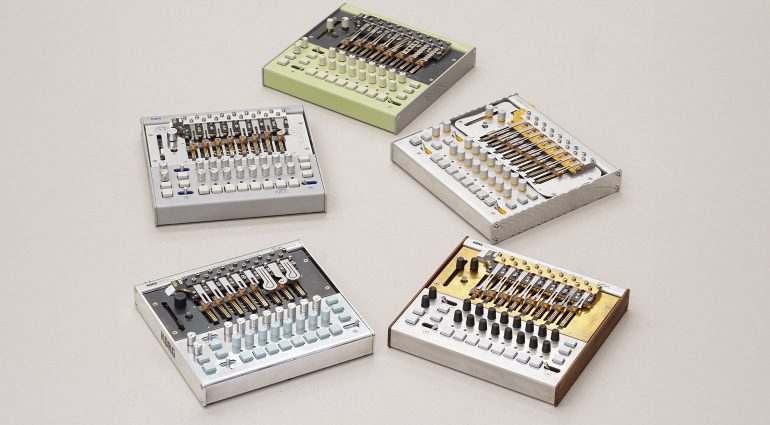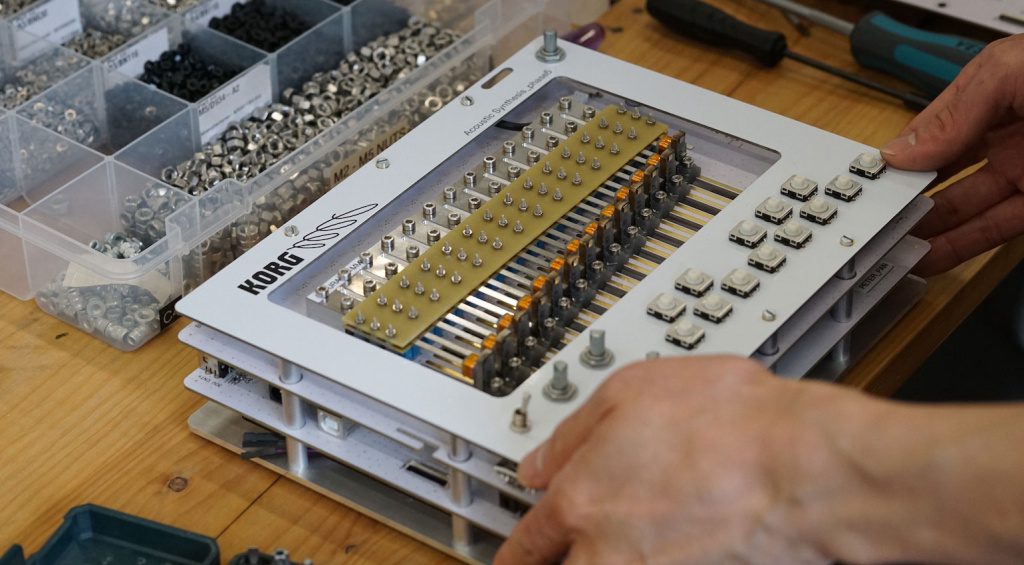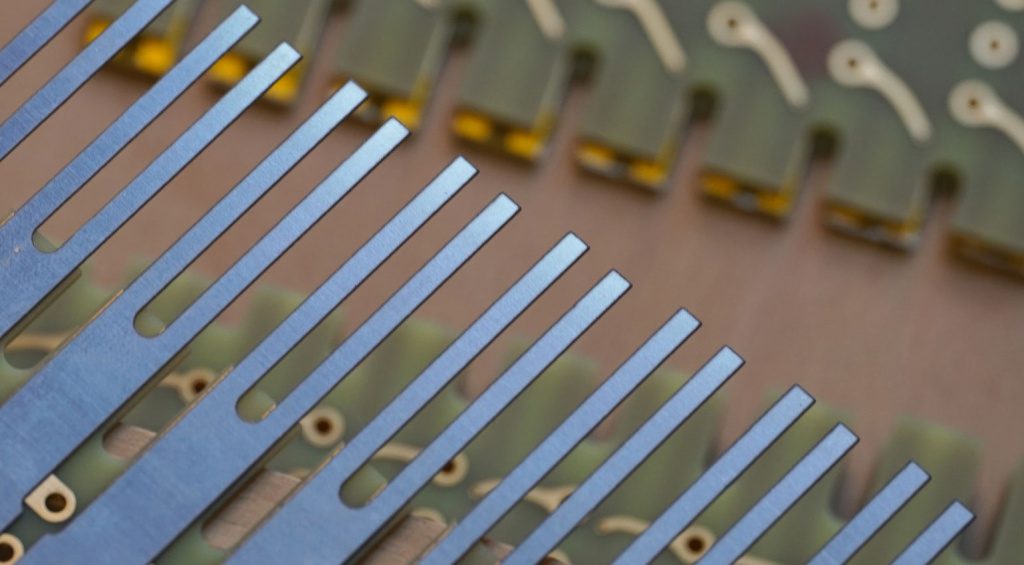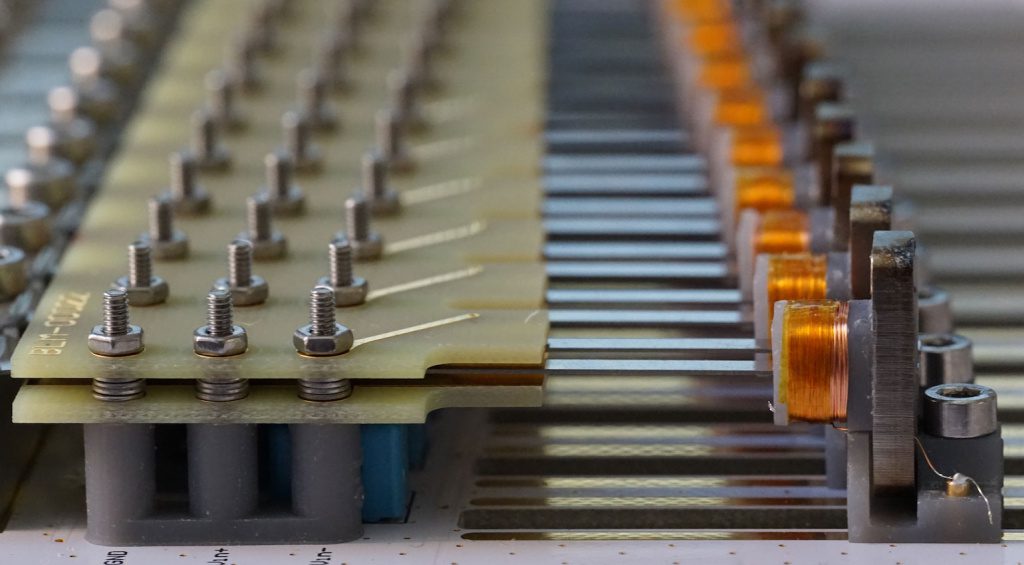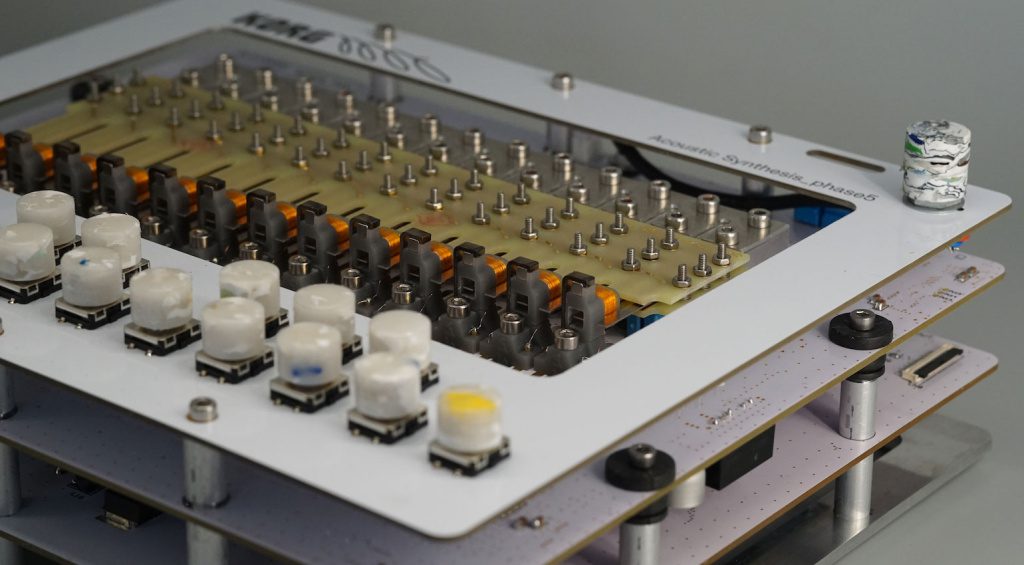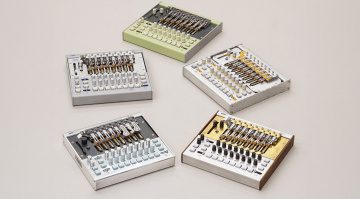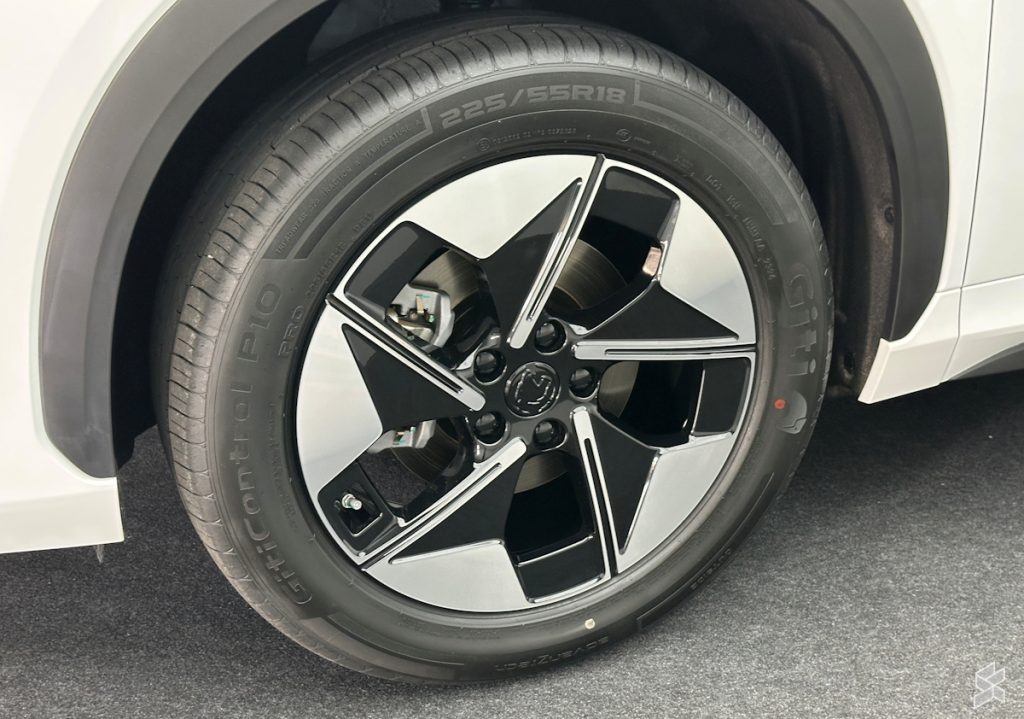[Update 14 May 2024] Korg Berlin is back with its latest electromechanical prototype, Acoustic Synthesis_phase8. “It is not a product just yet, but we are getting close”.

Korg Acoustic Synthesis_phase8
One of the most exciting devices at Superbooth 2023 was Korg Berlin’s Acoustic Synthsis_phase5 (see original article below). Combining physical metallic resonators with electronic synthesis, it represents an exciting possible future for electronic musical instruments.
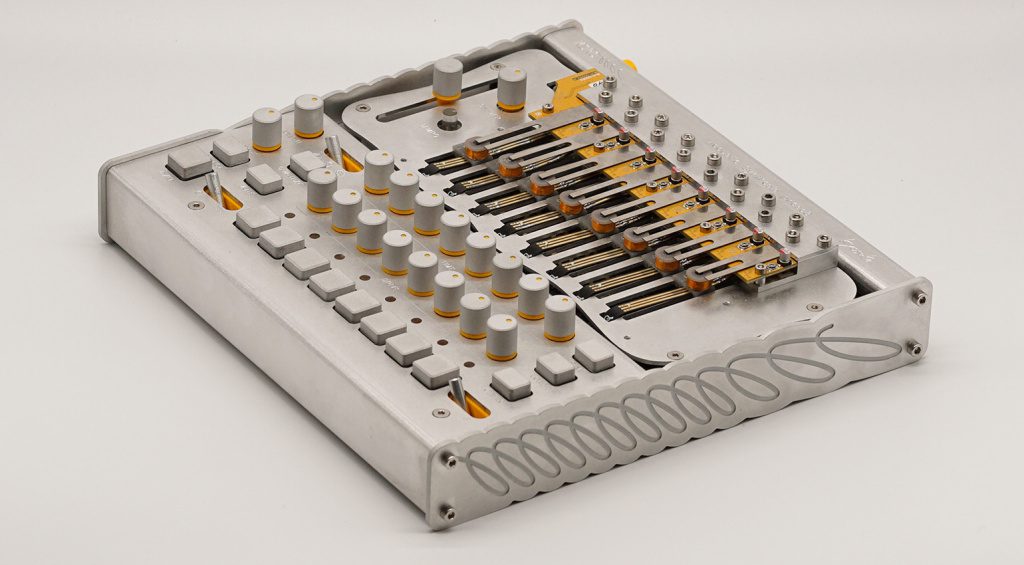
Now Korg Berlin is back at Superbooth24 with another prototype, Acoustic Synthesis_phase8. As I mentioned last year, it’s hard to explain, especially not having played one but according to Korg, it’s an acoustic instrument that is part melodic synthesizer and part drum machine. It has eight independent electromechanical voices and a sequencer with polyrythmic shifting. It also has waveshaping, tremolo and EG (envelope) control, replaceable and tunable resonators and mechanical sound-shaping possibilities.
Or, as Korg Berlin sums up, “Acoustic Synthesis unites the sonic richness of real physically vibrating bodies with electronic control”.
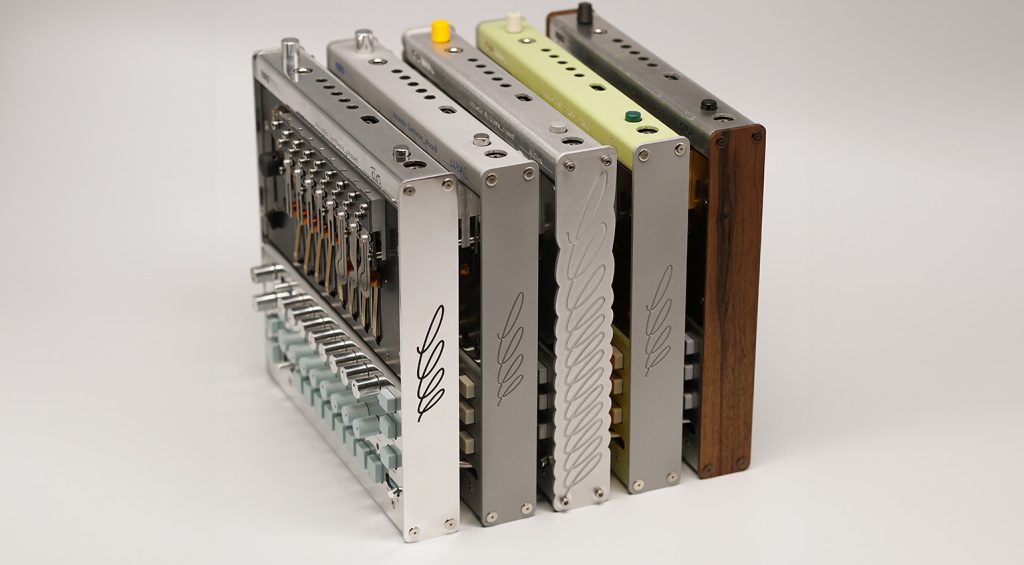
As for why there are five different models in the top picture there, Korg Berlin encouraged each of the developers involved to customize their own model.
When Will Korg Release Acoustic Synthesis?
Acoustic Synthesis_phase8 represents an advance on last year’s model (Phase5). It’s also closer to what the company hopes to release as a product.
“Acoustic Synthesis_phase8 is the first implementation of Acoustic Synthesis in a product-like form,” Korg Berlin said. “We expect many similarities between this and the eventual product release. While there are details to be ironed out, as we adapt the design for mass production, expect something along this trajectory.”
Very exciting stuff. That expected release date? “We should be back at Superbooth next year with our first product. Fingers crossed.” Woohoo!
[11 May 2023] New photos and details on the Acoustic Synthesis_phase5, Korg Berlin’s unusual hybrid electroacoustic synthesizer prototype.
Korg has released new photos and information about the Acoustic Synthesis_phase5, the prototype instrument that its German branch, Korg Berlin, will be showing at Superbooth 23.
According to Korg, the synth is “an early research development prototype. It showcases our newly developed Acoustic Synthesis technology.”
As for what Acoustic Synthesis is, it’s a little complicated, and not having tried it yet I’m reluctant to try to condense the information into something that may be incorrect. Instead, I’m going to let Korg speak for themselves:
What is Acoustic Synthesis?
Acoustic Synthesis unites the sonic richness of real physically vibrating bodies with electronic control.
Why is it special?
Think (of) the strings of a guitar, keys of a xylophone or the air in a flute; embedded into electronic synthesis. The prototype on display demonstrates our latest efforts in merging the physical world with electronics to make instruments that act and feel alive.
What are the physically vibrating bodies?
The vibrating bodies in this prototype are a set of fork-shaped metallic resonators. Their geometries have been tuned so they vibrate at the exact frequencies we would like them to.
How is the resonator made to vibrate?
Very much like in a piano, we hit it with a hammer. Except our hammer is electromagnetic. In technical terms, the scheme we use is called balanced armature, where the resonator is magnetised by a coil to make it move. This allows us to continuously supply energy to the resonators, even when they are in motion.
What does this vibration look like?
If you could zoom in and slow down time, you would see the complexity of the vibrations as the resonator twists, bends and contorts. These simultaneous movements can be broken down into modes. The different modes give each resonator its own unique voice.
How are the vibrations turned into signals?
It’s very similar to how a condenser microphone turns vibrations of a diaphragm into a signal. In our case the diaphragm is the resonator and it sits in air close to some plates held at about 50 volts. Any movement of the resonator causes a small change in the plate voltage. This small change is the signal we want and it contains the beautiful voice of the resonator. We have developed special plate geometries so the most pleasant
and expressive voices can be heard.
How are the signals used?
The signals from the resonators are fed into a feedback system. Here we compare the live signal from the resonator with a target signal we are hoping to achieve. The result of this comparison is fed back to the balanced armature driver, allowing us to compensate for any mismatch between the two signals. This allows us to maintain the electronic control over the resonators while letting them really sing out their beautiful voices.
This is all very heady and intriguing stuff. I’m sure once we can hear it this will make more sense for those of us without PhDs in physics.
It does represent an interesting new take on synthesis, though, and one that will probably see the eventual light of day as actual products and not just theoretical R&D. As Korg says of the Acoustic Synthesizer_phase5, “It is not a product just yet, but we see Acoustic Synthesis at the core of our future product releases.”
More on Korg
Original post from 9th May:
Korg Berlin Acoustic Synthesis_phase5
With little fanfare, a cryptic image appeared on Korg Berlin’s Instagram account. It showed what appeared to be a synthesizer without an enclosure, with the photo taken from the side. You could see a few knobs, some white and some marbled, as well as a switch and, inside, some circuit boards. It was accompanied by this text: “Incoming: Acoustic Synth_phase5.” Is this a new prototype from Korg Berlin? Excite!

Korg Acoustic Synthesis_phase5: The First Synth From Korg Berlin?
Due to the excitement generated by the image drop, Korg soon followed up with an official press release announcement. This is indeed a prototype for a new sound generation technology, “a form of acoustic synthesis which unites the sonic richness of real physically vibrating bodies with electronic control,” as Korg says in the press release. Real physically vibrating bodies? Super excite!
This will be the first instrument from Korg Berlin, which was founded by former Korg engineer Tatsuya Takahashi, the man behind a number of Korg’s biggest instruments in the company’s history, like the Minilogue, and Maximilian Rest, founder of E-RM Erfindungsbüro. I’ve been waiting to see what they produce and this is already exceeding my expectations.
What Is Acoustic Synthesis?
The press release doesn’t give much information about what acoustic synthesis is but looking at the new image, it appears that it involves electroacoustic sound generation. Sort of like Gamechanger Audio’s Motor Synth, Acoustic Synthesis_phase5 appears to use physical parts to generate sound. Inside the window on the front panel, there are 12 strips, likely one for each note in an octave. The piano key-like array of buttons below the strips supports this idea. Do they vibrate? Are they struck? That remains to be seen.
What the additional buttons on the front of the Korg Acoustic Synthesis_phase 5 do is also a mystery but we can guess that the one in the upper right is likely volume, with the others changing the quality of the sound.
Korg stressed to me that this prototype is “far from a final product” but it does suggest that exciting things are ahead.
We’re chomping at the bit to hear Korg’s Acoustic Synthesis_phase5 in action at Korg Berlin’s booth at Superbooth. Expect updates as we get them. If you’re heading to Superbooth, you can check it out too at booth Z440.
More on Korg
Image Sources:
- Superbooth24 Sponsors: GEARNEWS
- Korg Acoustic Synthesis_phase8: Korg
- Korg Acoustic Synthesis_phase8: Korg
- Korg Berlin Acoustic Synthesizer_phase 5: Korg Berlin
- Korg Berlin Acoustic Synthesizer_phase 5: Korg Berlin
- Korg Berlin Acoustic Synthesizer_phase 5: Korg Berlin
- Korg Berlin Acoustic Synthesizer_phase 5: Korg Berlin
- Korg Acoustic Synthesis_phase 5
: Korg

